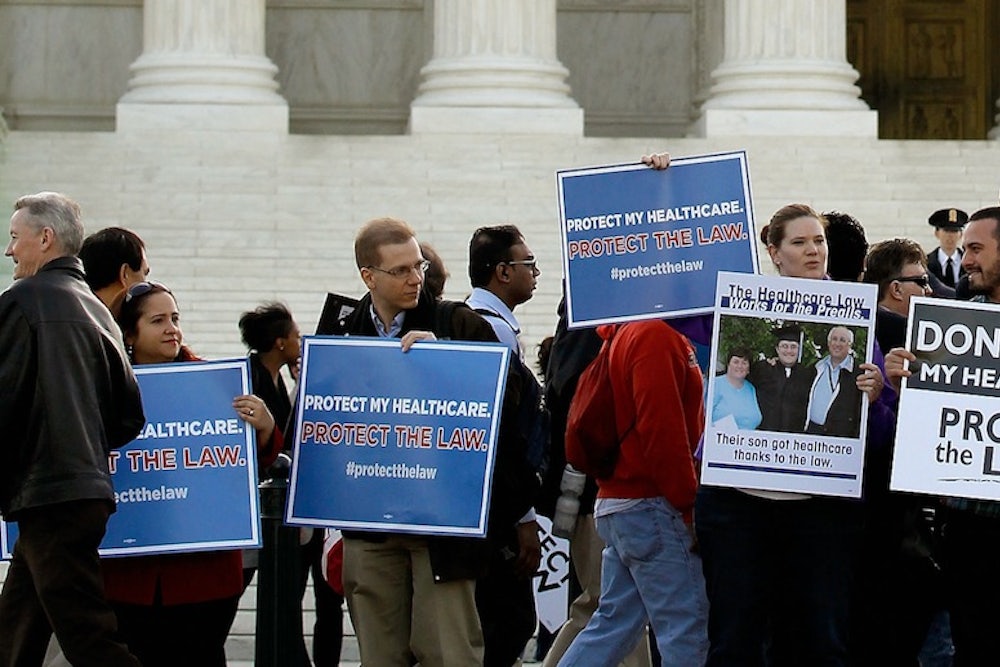The weekend’s big news actually broke on Friday: The Supreme Court has decided to hear King v. Burwell, one of the lawsuits challenging the federal government’s authority to hand out tax credits for millions of people using Obamacare to buy health insurance in 37 states.
The justices didn’t have to take the case, at least right now. Similar cases are working their way through the federal courts and there was a significant chance that all of the Circuit-level courts would ultimately reject the lawsuit, just as three judges in the Fourth Circuit did with King. The Court's decision to grab King for this term suggests that at least four justices think the lawsuit has merit, since it takes four to agree to hear a case. It could also suggest those four are confident they have a fifth vote on their side—enough, in other words, to constitute a majority.
The basis for the case, first developed by the Cato Institute's Michael Cannon and Case Western University's Jonathan Adler, is one ambiguous passage in the law. The controversy is over whether it matters and, if so, how to interpret it. If you’re reading this item, you probably don’t need a primer on the merits of the case—or lack thereof. (If want a refresher on the facts, click here; if you want to know why the case is so weak, click here.) But now that this lawsuit actually has a chance of succeeding, people are starting to talk about its potential impact, which could be severe.
Obamacare's tax credits are a critical part of the program—more critical, in fact, than the individual mandate that has caused so much controversy. Without those tax credits, millions of people would suddenly find insurance unaffordable. They’d stop paying their premiums and become uninsured. This, in turn, would trigger a secondary effect. Young and healthy people would drop coverage disproportionately, since they have the least incentive to pay higher premiums. Insurers would react by raising prices further, scaring away yet more people. In some places, the protections for people with pre-existing conditions—among the law's most popular features, even among conservatives—could become meaningless and even unsustainable.
One analysis, from the Rand Corporation, suggested that overall enrollment in the “non-group” market (that is, people buying insurance on their own) would decline by 70 percent. Another analysis, using a model developed by economist Jonathan Gruber and cited in an amicus brief signed by several dozen health policy scholars, suggested that the result of eliminating tax credits in the affected states would be 6.5 million additional people without health insurance.
Many of those people have insurance right now, thanks to the health care law, and in some cases they depend on the coverage to pay for life-sustaining treatments. My colleague Brian Beutler wrote about them on Friday, and singled out the story of a transplant patient named Jennifer Causor:
Without insurance, Jennifer [Causor’s] treatments would be completely unaffordable. Her transplant cost nearly $280,000. She takes three anti-rejection drugs, one of which has a sticker price of $2,400 per month…. Should she become uninsured, Jennifer would face bankruptcy and even death.
House Republicans have voted to repeal the Affordable Care Act 50 times, with more votes on the way. But those actions have been purely symbolic, with no chance of becoming law. With King, a Republican majority on the Supreme Court has an opportunity to do what Republicans in Congress cannot: Eliminate a big chunk of Obamacare, for a big chunk of the country. It would be an audacious act, particularly given the flimsy legal case. And there would be nothing symbolic about the effects this time. Real lives are at stake.
—Jonathan Cohn
News from the weekend
CATHOLIC CHURCH Pope Francis demoted a U.S. bishop who has been publicly critical of the Pope’s recent pronouncements on abortion and homosexuality. (Philip Pullella, Reuters)
OBAMACARE Determined to avoid the mistakes of last year, HHS officials unveiled a new, improved “window shopping” feature on healthcare.gov—and made it available to consumers a week before the next open enrollment period begins. (Jeffrey Young, Huffington Post)
EBOLA Six weeks after Thomas Duncan’s Ebola diagnosis marked the start of an outbreak in Texas, the state is officially Ebola-free. (Brady Dennis, Washington Post)
ATTORNEY GENERAL: Loretta Lynch, the federal prosecutor Obama just nominated to replace Eric Holder, has a record of handling big cases without grandstanding—or panicking. (Stephanie Clifford, New York Times)
DETROIT: A U.S. bankruptcy judge approved Detroit’s plan to exit bankruptcy, allowing the city to shed $7 billion in debt. (Chad Livengood, Detroit News, and Claire Groden, New Republic)
Articles worth reading
Wait a little longer on immigration, Mr. President Andrew Sullivan joins the chorus of pundits calling on Obama to hold off an executive order on immigration, so that Congress has a chance to act. (The Dish)
“Exceptional Voter Apathy” Sam Wang runs the numbers and confirms that historically low voter turnout hurt the Democrats. (American Prospect)
Stories we'll be watching
VA Secretary Robert McDonald plans to unveil a major reorganization of the agency's health care system.
At QED
Danny Vinik breaks down the jobs numbers. Rebecca Leber reports that Jim Inhofe, in line to take over a key environmental committee in the Senate, thinks that the late Michael Chrichton was a climate change expert. And this week the New Republic celebrates its 100th Anniversary. Look for articles from the anniversary issue, starting with Noam Scheiber’s deeply reported profile of Valerie Jarrett—a.k.a., “The Obama Whisperer”—and Franklin Foer’s essay on how the New Republic helped invent modern liberalism.
Clips compiled by Claire Groden and Naomi Shavin
